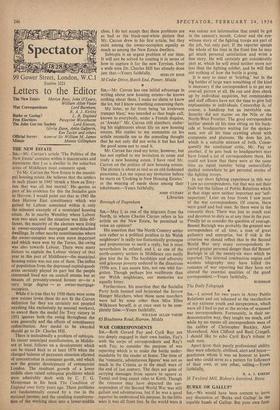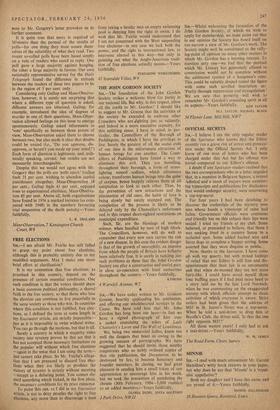BURKE OR GALLUP?
SIR,—We would have been content to leave any discussion of 'Burke and Gallup' in the capable hands of Gallup. But your own foot- note to Mr. Gregory's letter provokes us to further comment.
It is quite true that more is required of Ministers than the perusal of the results of polls—for one thing they must assure them- selves of the reliability of what they read. Two recent so-called polls have been based simply on a vote of readers who cared to reply. One poll gave a large majority against hanging. the other a large majority in favour. Our own nationally representative survey for the Daily Telegraph found the difference in attitude between the readers of these two papers to be in the region of 5 per cent. only.
Considering only Gallup and Mass-Observa- tion, however, it is surely not surprising that where a different type of question is asked, different answers are obtained. Gallup, for example, introduced the idea of degrees of murder in one of their questions, Mass-Obser- vation allowed feelings on this issue to emerge spontaneously. Gallup asked informants to 'vote' specifically as between three points of view, Mass-Observation asked them to choose between two, but also made it clear that doubts could be voiced (i.e., 'Do you' approve, dis- approve, or haven't you made up your mind?') Each form of question is legitimate, and, tech- nically speaking, correct; but results are not necessarily interchangeable.
Despite this we would not agree with Mr. Gregory that the polls are 'polls apart.' Gallup finds 21 per cent. wishing to abandon capital punishment altogether. Mass-Observation 18 per cent.; Gallup finds 41 per cent. opposed even to experimental abolition. Mass-Observa- tion 45 per cent. Above all, both organisations have found in 1956 a marked increase (as com- pared with 1948) in the numbers favouring trial suspension of the death penalty.—Yours faithfully, Court, W8



































 Previous page
Previous page